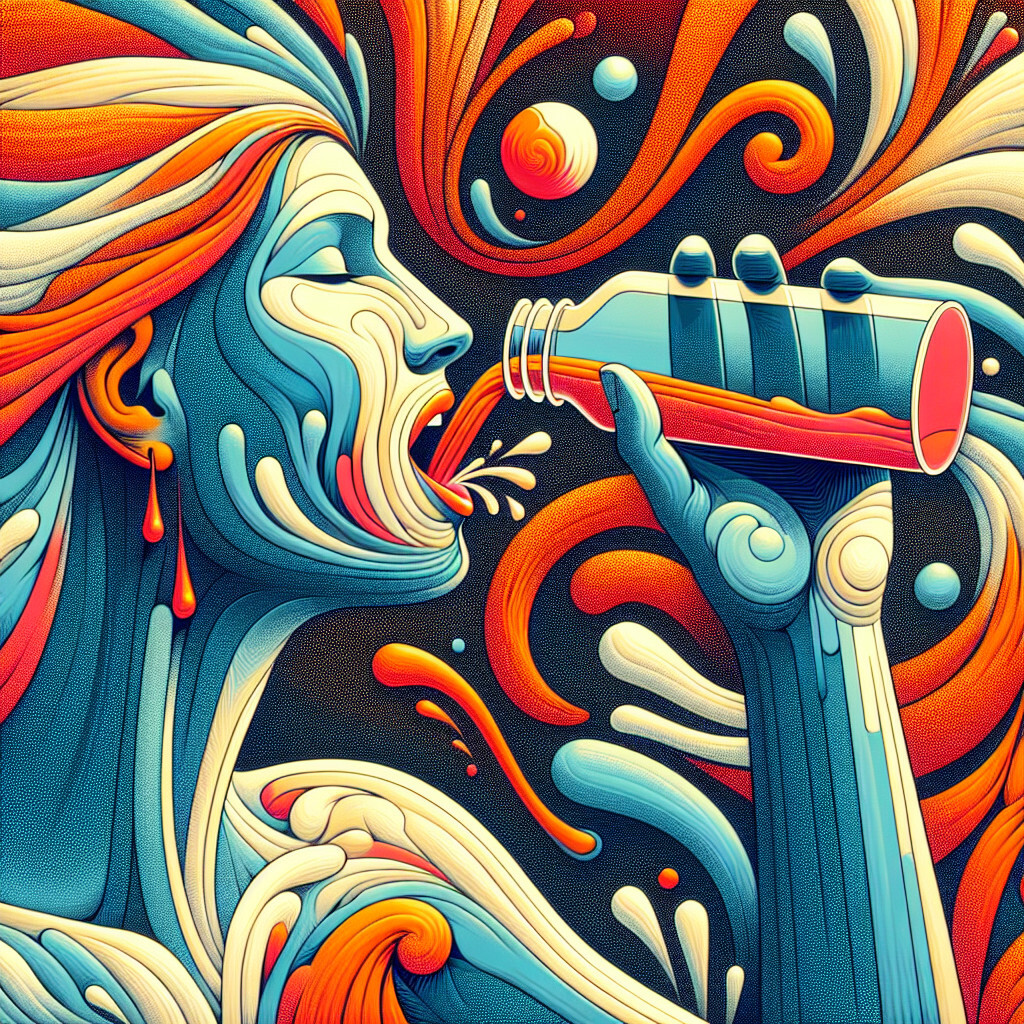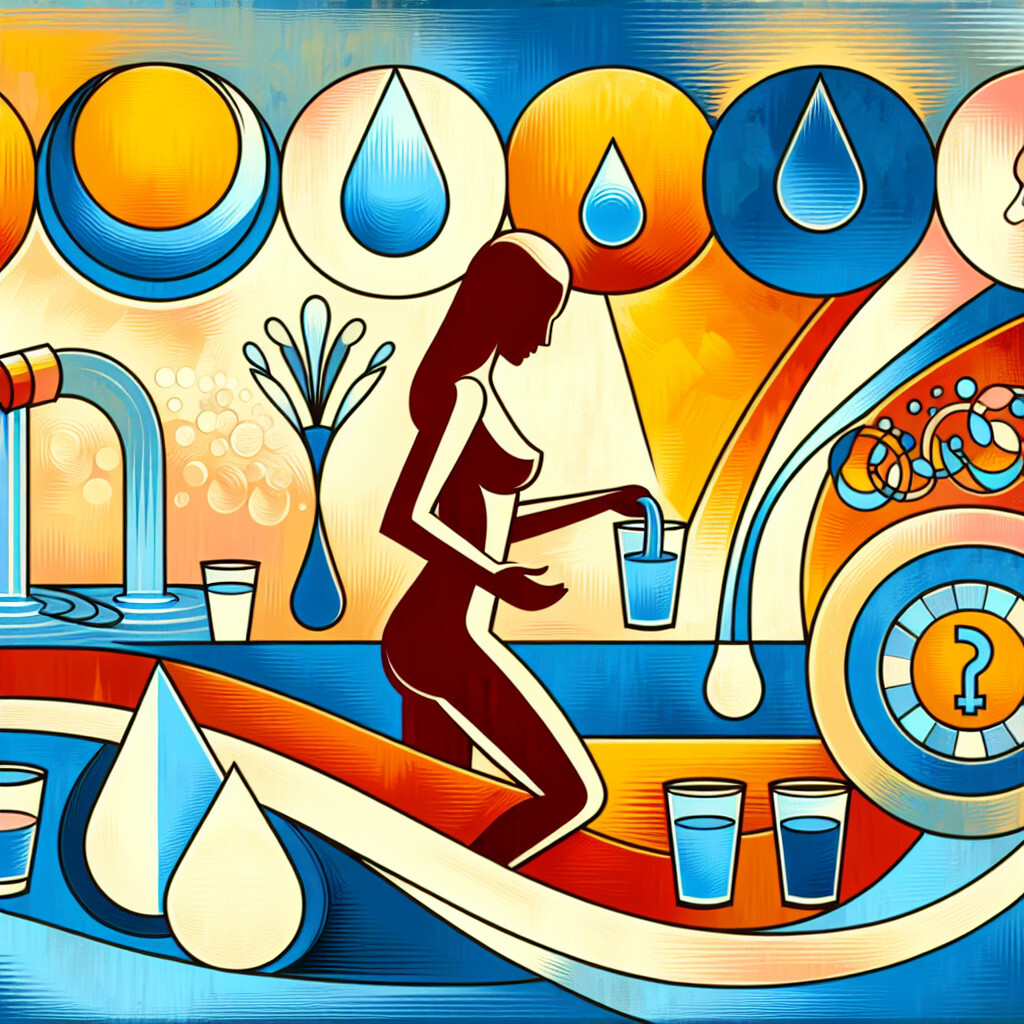-
Table of Contents
“Hydrate to Alleviate: Ease Period Discomfort with the Power of Water.”
Introduction

Drinking water during your menstrual cycle can offer numerous benefits, including alleviating bloating, aiding digestion, reducing period pain, and preventing dehydration. It can also help to regulate your menstrual cycle and reduce the chances of experiencing menstrual headaches. Furthermore, staying hydrated can improve your mood, energy levels, and overall well-being during this often uncomfortable time.
Understanding the Hydrating Power of Water During Menstruation
Understanding the hydrating power of water during menstruation is crucial for women, as it offers numerous benefits that can significantly alleviate the discomfort associated with this monthly cycle. The human body is composed of about 60% water, which plays a vital role in maintaining bodily functions, including the menstrual cycle. During menstruation, the body undergoes various hormonal changes that can lead to dehydration if not properly managed. Therefore, drinking water becomes even more essential during this period.
One of the primary benefits of drinking water during menstruation is the reduction of bloating. Bloating is a common symptom of premenstrual syndrome (PMS) that can cause discomfort and unease. It occurs due to water retention in the body, which is a result of hormonal fluctuations. By increasing water intake, the body is prompted to release the excess water it’s holding onto, thereby reducing bloating.
Additionally, water plays a significant role in combating fatigue, another common symptom experienced during menstruation. Dehydration can lead to feelings of tiredness and lethargy, as water is essential for energy production in the body. By staying hydrated, women can maintain their energy levels and combat the fatigue associated with menstruation.
Drinking water also aids in relieving menstrual cramps. Menstrual cramps occur due to the contraction of the uterus to shed its lining. Dehydration can exacerbate these cramps, making them more painful. Water aids in the proper functioning of bodily organs, including the muscles, and can help in reducing the intensity of menstrual cramps.
Furthermore, water is essential for the regulation of body temperature. During menstruation, hormonal changes can cause fluctuations in body temperature, leading to discomfort. Drinking water helps in maintaining a stable body temperature, providing comfort during this period.
Another benefit of drinking water during menstruation is the promotion of a healthy complexion. Hormonal changes during menstruation can lead to skin issues such as acne and breakouts. Water helps in flushing out toxins from the body, promoting a clear and healthy complexion.
Moreover, water aids in digestion and prevents constipation, a common issue during menstruation due to hormonal changes. Water helps in softening the stool and promotes regular bowel movements, thereby preventing constipation.
Lastly, drinking water can also help in managing mood swings during menstruation. Dehydration can affect the functioning of the brain, leading to mood swings and irritability. By staying hydrated, women can ensure the proper functioning of their brain, thereby managing mood swings.
In conclusion, understanding the hydrating power of water during menstruation is essential for women. Drinking water offers numerous benefits, including reducing bloating, combating fatigue, relieving menstrual cramps, regulating body temperature, promoting a healthy complexion, aiding in digestion, and managing mood swings. Therefore, women should ensure they stay adequately hydrated during their menstrual cycle to alleviate the discomfort associated with it.
How Drinking Water Can Alleviate Period Symptoms
Drinking water is a fundamental aspect of maintaining good health, but its importance becomes even more pronounced during menstruation. The menstrual cycle, while a natural and essential part of a woman’s reproductive system, can often bring with it a host of uncomfortable symptoms. These can range from bloating and cramps to fatigue and mood swings. However, staying well-hydrated by drinking plenty of water can help alleviate many of these symptoms, making the menstrual cycle a more manageable experience.
Firstly, water plays a crucial role in reducing bloating, a common symptom experienced by many women during their period. Bloating is primarily caused by water retention, which is the body’s response to hormonal changes during menstruation. Ironically, drinking more water can actually help reduce water retention. This is because when the body is dehydrated, it tends to hold onto whatever water it has, leading to bloating. By drinking more water, you signal to your body that it doesn’t need to store water, thereby reducing bloating.
Secondly, menstrual cramps, or dysmenorrhea, can be significantly eased by drinking water. Cramps are caused by the contraction of the uterus as it sheds its lining. Dehydration can exacerbate these contractions, leading to more severe cramps. Drinking water helps to keep the entire body hydrated, including the muscles of the uterus, making contractions less painful. Moreover, warm water can also help relax the uterine muscles, further reducing cramp intensity.
In addition to alleviating physical symptoms, drinking water can also help combat some of the emotional symptoms associated with menstruation. Hormonal fluctuations during the menstrual cycle can lead to mood swings and feelings of fatigue. Dehydration can exacerbate these feelings, making you feel more tired and irritable. Drinking water helps to maintain the body’s balance, ensuring that all bodily functions, including hormone regulation, are working optimally. This can help to stabilize mood swings and increase energy levels.
Furthermore, drinking water can also help to manage heavy menstrual flow. Water contributes to the proper functioning of the body’s circulatory system. When the body is well-hydrated, the blood is thinner and flows more easily. This can help to reduce the heaviness of menstrual flow and prevent the formation of blood clots.
Lastly, drinking water can also contribute to overall skin health. Hormonal changes during menstruation can often lead to skin problems such as acne. Water helps to flush out toxins from the body, including the skin, keeping it clean and reducing the likelihood of breakouts.
In conclusion, drinking water during menstruation can provide a multitude of benefits, from reducing physical discomfort to stabilizing mood swings. It is recommended to drink at least eight glasses of water per day, but this amount should be increased during menstruation to compensate for the additional water loss. While drinking water may not completely eliminate all menstrual symptoms, it can certainly make them more manageable. So, the next time you’re reaching for a remedy for your period symptoms, consider reaching for a glass of water first.
The Role of Water in Reducing Bloating During Your Period
Water, the most abundant and essential element on earth, plays a crucial role in maintaining overall health. Its importance becomes even more pronounced during menstruation, a time when the female body undergoes significant hormonal changes. One of the most common complaints during this period is bloating, a condition characterized by a feeling of fullness or swelling in the abdomen. This article aims to shed light on the role of water in reducing bloating during menstruation and the benefits of staying hydrated.
Bloating during menstruation is primarily caused by hormonal fluctuations. The hormones progesterone and estrogen influence the body’s water and sodium levels. When these hormones fluctuate, they can cause the body to retain more water and salt than usual, leading to bloating. Drinking water can help alleviate this condition by flushing out the excess sodium from the body. When the body is dehydrated, it tends to hold onto water as a survival mechanism, which can exacerbate bloating. Therefore, staying hydrated can help prevent water retention and reduce bloating.
Moreover, water aids in digestion by helping to break down food and absorb nutrients effectively. This process can help prevent constipation, a common cause of bloating. Drinking enough water keeps the digestive system functioning optimally, ensuring that waste moves through the intestines smoothly. This can help alleviate bloating and discomfort during menstruation.
Additionally, drinking water can help manage menstrual cramps. Dehydration can lead to muscle cramps, and since the uterus is a muscle, lack of water can exacerbate menstrual cramps. Staying hydrated can help relax the uterine muscles, reducing the intensity of cramps.
Furthermore, water plays a vital role in maintaining the balance of body fluids. These fluids are involved in various functions such as digestion, absorption, circulation, creation of saliva, transportation of nutrients, and maintenance of body temperature. During menstruation, the body loses a significant amount of fluid, which can lead to dehydration if not replenished. Drinking water helps to restore this balance, ensuring that the body functions properly.
Drinking water also helps to combat fatigue, a common symptom during menstruation. Dehydration can cause tiredness and fatigue as the body has to work harder to perform its normal functions. By staying hydrated, you can help boost your energy levels and combat fatigue.
In conclusion, drinking water during menstruation offers numerous benefits. It helps to reduce bloating, aids in digestion, manages menstrual cramps, maintains the balance of body fluids, and combats fatigue. It is recommended to drink at least eight glasses of water per day, but this amount may need to be increased during menstruation due to the loss of fluids. It’s important to listen to your body and drink when you’re thirsty. Incorporating foods with high water content, such as fruits and vegetables, can also contribute to your hydration levels. Remember, staying hydrated is not just crucial during menstruation, but it’s a key component of overall health and well-being.
Boosting Your Mood and Energy Levels with Water During Menstruation
Water, the elixir of life, plays a crucial role in maintaining overall health and well-being. Its importance becomes even more pronounced during menstruation, a time when the body undergoes significant hormonal changes. Drinking water during your period can have a profound impact on your mood and energy levels, helping to alleviate some of the discomfort associated with this monthly cycle.
The menstrual cycle is a complex process that involves a series of hormonal changes. These changes can lead to a variety of symptoms, including mood swings, fatigue, and physical discomfort. One of the most effective ways to manage these symptoms is by staying hydrated. Water plays a vital role in the regulation of hormones, and maintaining adequate hydration can help to balance hormonal fluctuations, thereby improving mood stability.
Moreover, water is essential for the production of serotonin, a neurotransmitter that contributes to feelings of well-being and happiness. Dehydration can lead to a decrease in serotonin production, which can exacerbate feelings of irritability and depression often associated with menstruation. By ensuring sufficient water intake, you can help to maintain serotonin levels, thereby boosting your mood during your period.
In addition to its mood-enhancing benefits, drinking water can also help to boost energy levels during menstruation. The process of menstruation can be physically draining, leading to feelings of fatigue and lethargy. Water is essential for the optimal functioning of the body’s cells and organs, including the muscles. By staying hydrated, you can help to ensure that your body has the energy it needs to function effectively, thereby combating fatigue.
Furthermore, water aids in the transportation of oxygen and nutrients to the body’s cells. This is particularly important during menstruation, as the body needs additional nutrients to compensate for the loss of blood. By drinking water, you can help to ensure that your body has the nutrients it needs to maintain energy levels and overall health during your period.
Water also plays a crucial role in the detoxification process. During menstruation, the body sheds the lining of the uterus, which can lead to the release of toxins. Drinking water helps to flush these toxins out of the body, thereby reducing bloating and discomfort, and contributing to a sense of well-being.
Lastly, drinking water can help to alleviate menstrual cramps. Dehydration can cause the muscles in the uterus to spasm, leading to painful cramps. By staying hydrated, you can help to prevent these spasms, thereby reducing cramp intensity.
In conclusion, drinking water during your period can have a significant impact on your mood and energy levels. It can help to balance hormonal fluctuations, boost serotonin production, ensure the optimal functioning of the body’s cells and organs, aid in the transportation of nutrients, facilitate detoxification, and alleviate menstrual cramps. So, the next time you’re going through your menstrual cycle, remember to stay hydrated. It’s a simple and effective way to improve your well-being during this time.
Q&A
Question 1: How does drinking water help during menstruation?
Answer 1: Drinking water helps to prevent bloating, a common issue during menstruation. It also aids in the prevention of dehydration which can often cause headaches and negatively affect your mood.
Question 2: Can drinking water alleviate menstrual cramps?
Answer 2: Yes, staying hydrated can help reduce menstrual cramps. Dehydration can cause muscles to cramp up, so drinking plenty of water can help alleviate this discomfort.
Question 3: How does water intake affect the menstrual cycle?
Answer 3: Adequate water intake can help regulate the menstrual cycle. Dehydration can lead to hormonal imbalances which can disrupt the regularity of the menstrual cycle.
Question 4: Can drinking water help with fatigue during periods?
Answer 4: Yes, drinking water can help combat fatigue often experienced during periods. Dehydration can lead to feelings of tiredness and lethargy, so staying hydrated can help maintain energy levels.
Conclusion
In conclusion, drinking water during your period can offer several benefits such as reducing bloating, aiding in digestion, preventing dehydration, alleviating menstrual cramps, and maintaining overall health. It can also help to replace the fluids lost during menstruation, thus preventing fatigue and mood swings.






